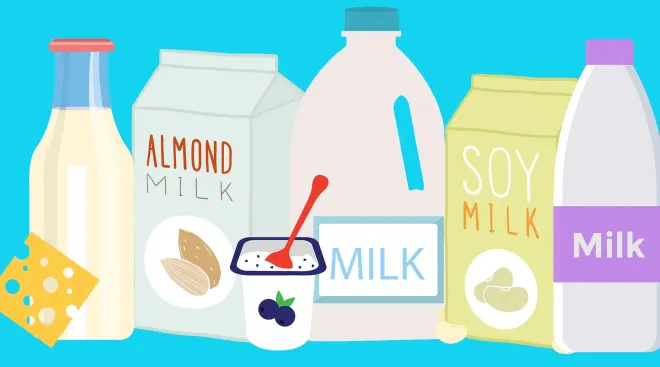Postpartum Nutrition: the Best Foods for Your Recovering Body
You’re healing, maybe nursing and—let’s face it—probably running on fumes. Between sleepless nights, diaper changes and figuring out your new normal, eating healthy can easily fall to the bottom of your to-do list. But here’s the thing: You just did something absolutely amazing that took up tons of energy, and now you need some serious TLC.
I’m less than two months postpartum myself with my second and would be lying if I said I wasn’t on my third day of granola bars for breakfast. Eating healthy during these early days is hard. But on the days I take some time to prioritize myself and fuel my body with nutritious food, I feel like a million bucks.
Giving your body the nutrients it needs is one of the best ways to support your postpartum recovery. You deserve food that fuels you, heals you and makes you feel like you again. Ready to dive into postpartum nutrition? Keep reading for the best postpartum food to nourish your body and keep you thriving as you navigate this wild, beautiful phase of life.
You just spent nine months sharing your vitamins, minerals and nutrients with a hungry, growing baby. Then you have the ginormous responsibility of giving birth, followed by long nights with little sleep. If you’re breastfeeding, there are even more nutrients your body needs to produce for baby. “So many people end up depleted after pregnancy and birth. And it doesn’t matter if you give birth vaginally or via C-section—there’s depletion,” says Lucy Chapin, CNM, NP, a certified nurse midwife with a clinical focus on peripartum nutrition at Mad River Birth and Wellness in Vermont. Simply put, your energy has likely been completely drained, and you need to restore it with nourishing food.
It’s not something to take lightly, either. Putting postpartum nutrition on the back burner can have some seriously negative effects like delayed healing, low energy, altered mood and a weakened immune system, says Yvette Hill, RDN, IBCLC, a registered dietitian nutritionist and lactation consultant specializing in postnatal nutrition in Colorado. Taking the time to fuel up with nutritious, healing foods is the ultimate hack for getting back to your normal.
What nutrients does your body need postpartum?
Some key nutrients your postpartum body needs to heal are iron, choline, fatty acids, protein, healthy fats, iodine, selenium, zinc and vitamin D, says Chapin. You’ll find that these vitamins and minerals are very similar to what you need in pregnancy.
When it comes to postpartum food, it’s best to focus on a diet that’s nutrient-dense, colorful and easy to digest. These kinds of foods will leave you fuller and filled with more energy to carry you throughout the (likely busy) day. Here are a few food groups and examples of each to fill your plate with, according to Chapin and Hill:
- Proteins: fish, chicken, liver, beef, beans and legumes, bone broth
- Fruits and vegetables: berries, apples, spinach and kale
- Whole grains: oats, quinoa and brown rice
- Healthy fats: eggs, avocados and olive oil
- Nuts and seeds: walnuts, almonds, chia seeds and flaxseed
- Fermented foods: yogurt, kefir and kimchi
And if you’re breastfeeding? Then you really need to bump up your protein and healthy fat intake for optimal milk supply, says Chapin. In fact, you might need about 330 to 400 extra calories each day compared to non-breastfeeding moms, according to Mayo Clinic. (Always make sure to talk to your healthcare provider about your individual needs!)
Not all postpartum food is created equal. Chapin says she encourages reducing intake of white flour since it can limit nutrient absorption—and it’s, of course, a good idea to limit or avoid highly processed and/or sugary foods in general.
You should also minimize caffeine and alcohol, notes Hill, which top the list of foods to avoid while breastfeeding. On top of that, if you’re struggling with constipation—which a whopping 52 percent of postpartum moms are—you should steer clear of foods that can block you up, like fried foods, cheese and processed meats.
With all the soothing, bouncing, cleaning up blowouts and feeding baby, eating can sometimes take a backseat. “What I’ve witnessed as a midwife, health coach and mother myself is that mothers are incredibly selfless,” says Chapin. “They’ll often hyperfocus on their babies. But sometimes this myopic devotion means they’re not nourishing themselves with rest or food.”
Whether or not you can relate, you could probably use some help optimizing your postpartum diet. Here are some postpartum nutrition tips to help you get started:
- Eat smaller, frequent meals. Most people in early postpartum will feel the natural need to eat every couple of hours to keep their blood sugar stable, says Chapin. Lean into this feeling and nourish your body whenever you feel hungry—day or night!
- Don’t be in a hurry to shed weight. Cutting out food groups or drastically reducing calories can counteract your healing process. Hill recommends slowing down and not being in a hurry to lose weight. Take this time to recover while nourishing your body.
- Easy-to-eat foods are your friend. You’ll often find yourself with only one hand available to feed yourself. Try stocking up with foods like muffins or egg bites that you can easily grab to fuel you up, recommends Chapin.
- Keep a water bottle handy. Staying hydrated is vital postpartum. Drinking around 100 ounces of water daily is a great goal, says Chapin. Of course, keep in mind that this depends on your activity levels and body composition. “Like eating, I’d also drink intuitively,” she adds.
Frequently Asked Questions
What are the traditional postpartum foods?
Different cultures have different traditional postpartum foods. But typically, postpartum foods are very nutrient-dense and packed with energy. Think foods with high protein content, healthy fats and deep-colored fruits and vegetables. Some examples are beef, bone broth, berries, leafy greens, eggs, avocados, nuts and seeds.
Can you follow a weight-loss diet postpartum?
Following a restrictive diet postpartum isn’t recommended, warns Hill. Leaving certain food groups out and not eating enough calories daily can lead to muscle loss and decreased energy.
What are the best ways to meal prep for postpartum?
Cook in big batches, like planning sheet pans with meats and veggies or putting together lots of breakfast burritos or egg muffins at once. Also, think about protein-rich snacks like nut mixes or hard-boiled eggs, says Chapin. These will give you more sustainable energy than commercially processed snacks and meals. She also suggests " cheating” where you can to save time. Choosing pre-cut fruits and veggies from the store rather than cutting them yourself can make life much easier.
Should you take vitamins postpartum?
A high-quality vitamin can act as a security blanket for when life gets busy and you’re not checking all the nutritional boxes. Generally, many people can continue their prenatal vitamin (yup, you can take the same vitamin as you did when you were pregnant), and some may need other added nutrients as well, such as vitamin D, iron or omegas, says Chapin. Once you finish your prenatal bottle, you can also look into postnatal vitamins—these are made specifically for parents who recently gave birth to support a recovering body.
Keep in mind that all food advice is highly individualized, and if you have any specific conditions or concerns, it’s important to speak with your healthcare provider. Bon appétit!
Please note: The Bump and the materials and information it contains are not intended to, and do not constitute, medical or other health advice or diagnosis and should not be used as such. You should always consult with a qualified physician or health professional about your specific circumstances.
Plus, more from The Bump:
Lucy Chapin, CNM, NP, is a certified nurse midwife with a clinical focus on peripartum nutrition at Mad River Birth and Wellness in Vermont.
Yvette Hill, RDN, IBCLC, is a registered dietitian nutritionist and lactation consultant specializing in postnatal nutrition in Colorado.
BJOG: An International Journal of Obstetrics and Gynaecology, Pregnancy, Puerperium and Perinatal Constipation - An Observational Hybrid Survey on Pregnant and Postpartum Women and Their Age-Matched Non-Pregnant Controls, May 2021
Johns Hopkins Medicine, Foods for Constipation
Mayo Clinic, Breastfeeding Nutrition: Tips for Moms, April 2022
Learn how we ensure the accuracy of our content through our editorial and medical review process.
Navigate forward to interact with the calendar and select a date. Press the question mark key to get the keyboard shortcuts for changing dates.
Advertisement
Advertisement
Advertisement
Advertisement






















































